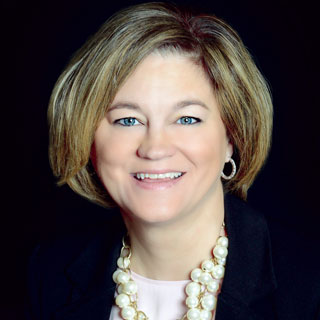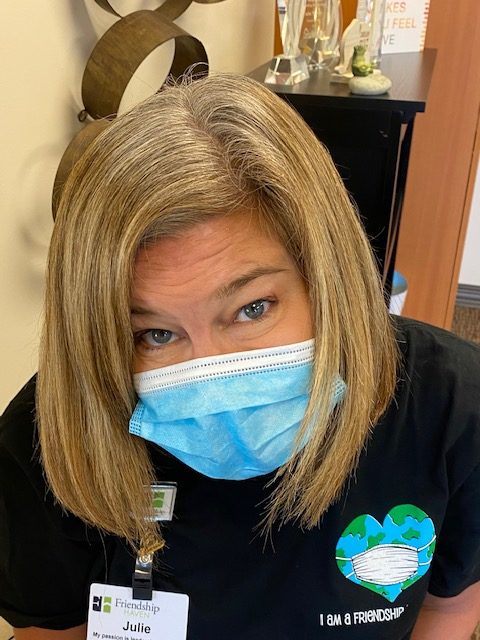
I’m 46.
I bet you just thought one of three things.
“She’s still pretty young.”
“She’s getting up there.”
Or … the third option, “Good for you, but why would you start a blog that way?”
The last time my hair was colored was in February. I don’t know the exact date, because back then it was just a matter of time before I colored my hair again. Wow, have things changed. Not only do I not plan on coloring my hair again, but it’s taken on a new meaning for me personally. If you are wondering what this has to do with leadership in senior care, hang on. I’m about to drop some 46-year-old wisdom on you.
I entered the world of #embracethegrey as a fluke, a notion that maybe after 20 years or so of color, highlights, and lowlights I would give it up, if for no other reason than salons were closed. Duh.
It’s become much more meaningful to me personally. When the pandemic started, there was no way it would last until July! I remember many people saying things like, “We will get through this,” and, “We will be better off because of it.” Two months in that sounded hopeful, encouraging even, like we should be thankful for the time we were socially isolated, slowing down a bit and focusing more on what’s important. Four plus months in, things are a little different.

When I decided to stop coloring my hair it was a whim. Most around me laughed and told me, “Sure you will; you will color it again.” “You are too young to go grey.” Those comments made me stop and think even more about the decision. What does this say about me? I am an advocate, a champion for those who have grey hair. Why would I not embrace it rather than fight it? Am I a true leader for those people? Really? At what age does grey hair really change perception?
Through the pandemic, it has become clear to me that we as a society do not value the older generation. That if you have grey hair, somehow you have less value. I listened to press conference after press conference where “life” was seemingly returning to normal for everyone except those over 65. Those over 65: You stay home and continue to social isolate. How does that make any sense?
The priority through the pandemic has not been for those over 65. Where has the outrage been? Is it simply accepted because they are older?
As I’ve watched the demarcation line of my grey hair mesh into my brownish hair, it’s been a constant reminder of the fight that we in long-term care battle every day. Agism is still alive and well. COVID hasn’t ended; those we serve are not expendable. The pandemic has shined a light on that so bright we can no longer ignore.
My emerging grey hair at times has been frustrating, maddening even. I’ve also felt at times embarrassed by it. This outward growth is a reminder that things will never be the same. I certainly see similarities during the pandemic. I’ve been frustrated beyond belief, I’ve been madder (at what I don’t know) than I have ever been in my life, and I’ve been embarrassed by my personal lack of courage during a time when leaders in our field need to have more courage than ever before.
Lately I’ve been hearing a lot about the new normal. We need to learn to live with COVID. I agree, but for me I will remember this time in my life as a time when I led through a pandemic. I embraced my authentic self by letting my grey hair become my silver lining. It’s also been a time that there is a visible reminder that this work we do is personal; it means something more than a job to all of us in senior services. I’m proud of the work we do and I’m not ashamed to show it, even if it’s something as simple as the silver sparkles that keep peeking through every day.
My hope is that by the time it grows out and I have a full silver head of hair, something will have changed. It’s my personal silent stance on embracing age. There is value in age. We learn more, we offer wisdom and we embrace life. To those that have made this personal journey before me, thank you for showing me the way. It is a big deal; it matters and it’s meaningful.
Whether you choose to color your hair or not I don’t judge. For me it’s been a constant reminder that leadership must be authentic; glancing at my hair every morning reminds me authenticity comes in many colors. During the pandemic if there is one thing I have learned, becoming your authentic self is the silver lining.
Julie Thorson was the 2018 recipient of the LeadingAge Dr. Herbert Shore Outstanding Mentor of the Year award. Thorson is currently a coach for the Leading Age’s Larry Minnix Leadership Academy. Her “Living Leadership” blog was named the 2016 “Best New Department” Bronze Award winner by the American Society of Health Publication Editors. The president and CEO of Friendship Haven, a life plan community in Fort Dodge, IA, Thorson is a coach’s daughter at heart. A former part-time nursing home social worker, she is a licensed nursing home administrator and recently completed Leading Age’s Leadership Educator Program.





